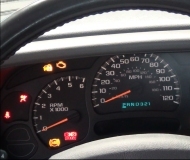Reading diagnostic fault codes is just a tiny percentage of what scanners do. One of their main uses is viewing the live data the computers see and act on. That is what we need to do when there are no fault codes to get us started. Even when there are fault codes, those only indicate the circuit or system that has the problem. I'd equate your code reader to your family physician, and your body to all the computers in your car. You can read fault codes, but only in the Engine Computer. Your physician can figure out which part of you has the problem, but then he has to send you to the specialist. The fault code gets you to the circuit, but you may need the scanner, (the specialist), to view the incoming sensor data, command outputs to activate, and watch what happens when you force defective conditions to occur.
When the people at auto parts stores read fault codes for you, they almost always are using a simple code reader like you are, and they only read codes in the Engine Computer. Mechanics use scanners that can access all the computers on the vehicle, and provide a lot more information, but they also cost about 100 times as much as a code reader. To make it even more insulting, some of the more popular scanners "only" cost around $4000.00, but the company charges $1000.00 per year for the updates, and you can't skip any years. That's why shops have to charge for using them.
You've reached the mechanic's dilemma where there are no fault codes to get us started. And remember, even if you did find a fault code, they never say to replace parts or that one is bad. Even when a part is referenced in a code, that part is actually the cause of that code about half of the time. They just get us into the circuit with the problem. With no code to go on, you have to use the scanner to figure out what looks wrong.
I should mention too that sensors develop a signal voltage, and to use a common 5-volt sensor for my sad example, its acceptable range of signal voltage would typically be 0.5 to 4.5 volts. The problem is if it develops the wrong voltage, the computer will act on it, as long as it stays within that acceptable range. It has to go below 0.5 volt or above 4.5 volts to set a code. We have to be smart enough to know that 3.0 volts is an acceptable voltage, but it's the wrong voltage if it doesn't agree with the condition. For example, at idle, a throttle position sensor will read near 0.5 volts. It had better not be reading 4.2 volts if we aren't pushing the accelerator pedal.
The position sensors I described earlier develop a different type of signal. Voltage has nothing to do with what the computer reacts to. Those are timing pulses, and voltage is not that important. There is no easy way to observe those pulses, and if we did, there would be no way to figure out if they're showing up at the right time. The computer does that, then it talks back and forth with the scanner so it can display that information.
Friday, June 23rd, 2017 AT 6:08 PM





